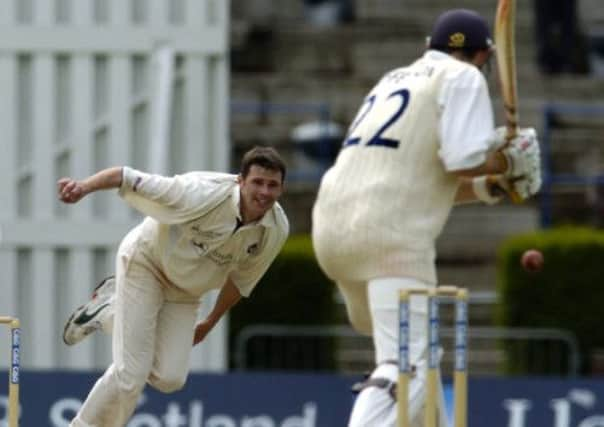End of road for Saltires but journey worthwhile


But how will Scotland, our bona-fide national team, deal with the demise of its contrived sister vessel?
Cricket in this country will cease to rely for competition on the English county structure as of Thursday’s final YB40 match against Lancashire at Titwood, leaving Pete Steindl’s men with international action alone to prepare for.
Advertisement
Hide AdAdvertisement
Hide AdFor any nation outside the International Cricket Council’s full membership of ten this can be an unreliable crutch, and ten years ago it would have seemed like a one-way ticket to obscurity.
The Saltires concept came about because Scotland had finally been granted access to England’s one-day county league structure, a long-term aspiration that had first taken seriously during the tenure of Jim Love.
As the Saltires were going up against professional counties, each harbouring two overseas players, in the Norwich Union League, it would have threatened Scotland’s credibility as an international side to go into battle with foreigners without a brand tweak.
So the Saltires were born, and Craig Wright’s team enjoyed a blissful beginning. They beat Durham at Chester-le-Street, scene of this weekend’s fourth Ashes Test, and then Ryan Watson battered Somerset into submission at a dusky Grange before the team superbly stifled Lancashire at Old Trafford.
Rahul Dravid then arrived, stylishly late but never anything but stylish, but for all the ticket sales and the hundreds that the great Indian generated on Scottish cricket’s behalf, he couldn’t arrest the reality check that quickly beset the whole enterprise, making the native players realise they would never be able to sustain a 17-match season of competing in the top half of the league.
Those heady early days were ten years ago, and apart from three consecutive wins against unexceptional opposition in the wake of the 2007 World Cup, the rest of this decade-long experiment has consisted mainly of sobering defeats that illustrated a yawning chasm in resources.
So was it worth it? There is no better man to ask than Wright, the totemic leader of Scotland and the Saltires until the 2007 World Cup, who has just coached Scotland under-19s through a perfect World Cup qualifying campaign that mirrored the senior team’s march to the ICC Trophy title in 2005.
“It has been an important vehicle for the development of our cricketers individually, and has assisted the team in preparing for international competition,” wrote Wright from the U19 camp in the Netherlands this week.
Advertisement
Hide AdAdvertisement
Hide Ad“Without it I am not sure we would have had the quantity or quality of cricket to justify the transition of the Scotland playing squad from amateur to semi-professional to full-time status that has occurred during that period.
“To have a player (and person) of the calibre of Rahul Dravid playing in the Saltires team in 2003 was a great boost for the profile of the game in Scotland, and a great thrill for those who had the opportunity to play alongside him.
“However, perhaps of greater value in terms of building the team were the matches the team won in 2003 against counties with a number of international-calibre players before the great man arrived.”
When Wright hankers back to those halcyon days, it illustrates how far the game has come, even if Scotland have stalled as an international side since Ireland leapt ahead of the pack in 2007.
Prior to that NUL start, Scotland away was seen as a plum draw in the Benson & Hedges Cup for both competitive and social reasons, and the wider world assumed this country was just another cricketing backwater.
“There was a general ambition amongst the team at that time to change people’s perception of the Scottish cricket team,” said Wright. “I think having the opportunity to play against and beat the English teams helped in some way to do that.
“On the flip side, it could perhaps be argued that the county matches have become counter-productive in recent times with Scotland rarely able to field their strongest team and consequently finding wins hard to come by.”
In that sense, then, is it good riddance? Wright’s view is that there is no reason why fixtures against Australia A or South Africa A, and more against the elite, cannot fill the hole and keep the turnstiles at Citylets Grange from rusting.
Advertisement
Hide AdAdvertisement
Hide Ad“Time moves on, and the hope has to be that Scotland has out-grown the need to play in the English domestic game, and that the future lies purely on the international scene,” said Wright.
“For that to work, the ICC has to show that it is serious about expanding the game globally and provide countries like Scotland and the other top ranked Associate members with increased opportunities to show they deserve to bigger players on the international scene.
“If that doesn’t come to fruition then I fear there may come a time when the quality and quantity of cricket that has been provided by our inclusion in ECB competition over the past decade will be missed.”